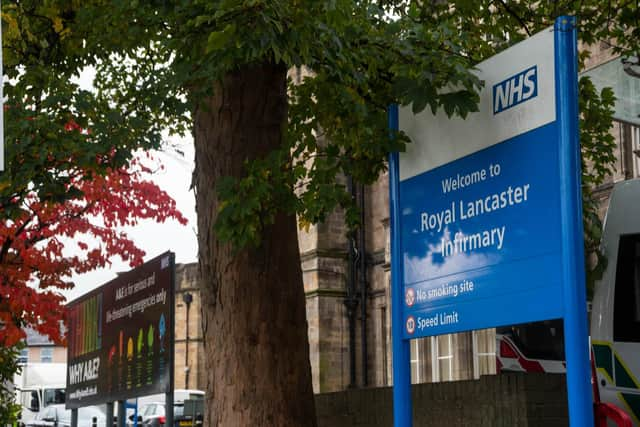Morecambe Bay hospital bosses apologise after report finds 520 patients suffered 'actual or potential harm' in failing urology department
and live on Freeview channel 276
The damning report by Niche Health and Care Consulting into the University Hospitals of Morecambe Bay NHS Trust (UHMBT) urology service highlighted the areas for improvement after finding "actual or potential harm" was caused to 520 patients.
And it says it cannot conclude that patients were safe within the urology service "at all times" in the last 20 years.
Advertisement
Hide AdAdvertisement
Hide AdChief executive Aaron Cummins said the trust "fully supports and accepts" the findings, and apologised to patients and families "who have experienced any kind of harm or distress caused by the events".


The report says: "We cannot conclude that patients were safe within the urology service at all times in the last 20 years. There were clearly incidents that point to significant harms, but the reporting systems and monitoring of harms means that a definitive picture cannot be secured.
"We have, however, identified 520 cases where actual or potential harm occurred. A key concern is the combined failure to consistently report and robustly investigate patient safety incidents and concerns as they arose, through whichever source these were identified."
The 226-page report found "several missed opportunities" which, had they been recognised, and a different course of action followed, may have affected the outcome for the patient and the experience of the family, including in the seeking of answers to their questions after the patient died.
The missed opportunities include:


Advertisement
Hide AdAdvertisement
Hide Ad*A significant and unacceptable delay in managing the patient’s diagnosis, in securing discussion about the care options and in referring the patient to the regional centre at the Royal Hospital Preston for treatment.
*Repeated delays in reporting scan results which lengthened the overall diagnostic and treatment timeline.
*Repeated delays in arranging a cystoscopy and stent change, a lack of active consideration to the need for the stent to remain in place, and a failure to consider alternatives such as a nephrostomy. This was compounded by a lack of arrangements for advance booking for monitoring cystoscopies from one procedure to the next.
*A failure to review the patient’s abdominal x-ray prior to discharge and to ensure that the patient was fit to go home.
Advertisement
Hide AdAdvertisement
Hide Ad*A failure by the general surgical team to recognise the patient’s deterioration and to refer earlier to urology.
*A failure by the general surgical and urology teams (despite sharing the same ward) to liaise on multiple occasions and to take a rounded view of the patient’s needs. This was compounded by there being no formal process for referral between clinical teams and a practice of communicating via the medical records.
*A lack of communication between urologists including a failure to handover from one consultant to another on two separate nights.
*Repeated failures to take the patient to theatre on four consecutive days for a stent change.
Advertisement
Hide AdAdvertisement
Hide Ad*A failure to talk to the patient’s family about the risks of operating, particularly on the day of his stent change, and, in the absence of the family, to seek a second opinion as to best interests given the patient’s inability to consent.
The department also had a "wholly inadequate" mortality review process and did not review each inpatient death, even though the numbers were small.
There was also a failure to recognise a series of increasing concerns and requests for information from family members and then to follow appropriate processes so that resolution could be achieved either through the trust or by onward referral to the Ombudsman.
This meant some concerns were protracted and continued to remain fully unanswered for several years.
Advertisement
Hide AdAdvertisement
Hide AdThe report blames a lack of communication within the department to lead to fragmented oversight of the myriad of issues.
A cohesive plan of action could not be developed as a result as no one department had the full picture. These limitations at board level were compounded by departmental weaknesses including ill-defined line management, poor and inconsistent approaches to job planning, a lack of support to clinical leads, weaknesses in the resolution of grievances, some inadequate investigations and investigation outcomes not being shared amongst the team.
The report found that clashes within the consultant body in the urology department at the trust began as far back as 2000 and could be attributed to a range of factors including issues of personality, background, governance, training and variations in clinical approaches.
Concerns started to be raised by whistleblower Peter Duffy, himself a consultant urologist within the trust at the time, and were based upon a belief that sub-standard care was being delivered by another consultant.
Advertisement
Hide AdAdvertisement
Hide AdThe father-of-three later spoke of how he was forced to move away from his family and friends to find work after feeling shunned by the NHS in England following an employment tribunal.
He now works at Noble's Hospital on the Isle of Man, which has a separate health system from the UK, while his family continues to live in Lancaster.
The Niche report found that the root cause of the polarity in the team was the failure at all levels to investigate issues and allegations robustly.
"There were undoubtedly failures to act competently and professionally at times by several consultants," the report says. "There is evidence of harms and near misses through some procedures being conducted or not conducted as well as poor clinical decision making.
Advertisement
Hide AdAdvertisement
Hide Ad"However, the way concerns were raised, managed, investigated and audited enabled similar poor governance processes to become the norm within the department and left inappropriate behaviours unchallenged."
UHMBT chief executive Aaron Cummins said: “We fully support and accept the findings of the report.
"On behalf of the trust, I would like to apologise to patients and families who have experienced any kind of harm or distress caused by the events chronicled in the report.
"Some progress has already been made over the last couple of years and the trust will continue to ensure improvements are made as quickly as possible and are sustained.”
Advertisement
Hide AdAdvertisement
Hide AdIn a full statement, UHMBT said: "We fully support and accept the findings of the report. At all times the trust has endeavoured to be open and honest in wanting to establish the truth behind allegations and counter allegatipns within the urology department.
"When reading the report, it is very clear that although the trust had taken significant action over a period of time to attempt to tackle various concerns that arose, the actions that were taken were not detailed or robust enough to ensure the improvements were sustainable and embedded, and more should have been done.
"We would like to apologise to patients and families who have experienced any kind of harm or distress caused by the events chronicled in the report.
"We would also like to assure them and our wider communities that our trust remains committed to ensuring that the work done over the past two years to improve the service continues and becomes embedded.
Advertisement
Hide AdAdvertisement
Hide Ad"We want to thank Mr [Peter] Duffy and those who raised concerns.
"We also want to thank Niche Health and Social Care Consulting for their report, and NHS England and Improvement for their support in commissioning the report. They have all helped us to get to where we are today.
"We want to thank members of the urology team who in recent years have worked so hard to improve their service. They are a group of incredibly dedicated individuals who are committed to delivering the best possible services to their patients.
"At the heart of the Niche report is an investigation into one index case. It is clear that there was a great deal for the service and the trust as a whole to learn from and my thoughts go out to the family of that case.
Advertisement
Hide AdAdvertisement
Hide Ad"We hope this investigation, and our pledge to ensure the learning is embedded into all that we do is some small comfort for the family.
"This trust, and the health and care system, will now continue to work together to ensure that the improvements we have seen continue for many years to come.
"Part of that will be evidenced in our Safe Today report which looks at a series of metrics providing assurance and reassurance that the service continues to improve.
"This is monitored regularly not only by the trust but also by the regional System Improvement Board so that we can all be sure that the service is as safe as possible for our patients, families and colleagues."
Advertisement
Hide AdAdvertisement
Hide AdDr David Levy is regional medical director for NHS England-Improvement North West and chair of the System Improvement Board that has been set up to oversee improvements at the trust.
“We are grateful to past and present employees of the trust, patients and stakeholders who came forward to raise concerns about services within the Urology and Trauma and Orthopaedic departments," he said.
"Both investigations are clear that the trust has in the past failed to investigate and respond effectively when complaints and concerns were raised.
"The trust is clear in its commitment to continue to make improvements and NHS England-Improvement is working with other partners to provide the additional support needed to ensure improvements are made as quickly as possible and are sustainable."
The full report can be read here.
Comment Guidelines
National World encourages reader discussion on our stories. User feedback, insights and back-and-forth exchanges add a rich layer of context to reporting. Please review our Community Guidelines before commenting.
